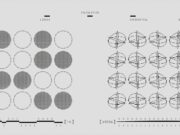computing is revolutionizing how we process information. It leverages the principles of quantum mechanics to solve problems classical computers can’t handle efficiently. From Quantum healthcare to finance, this cutting-edge technology promises to reshape industries in quantum computing.
What Is Quantum Computing?
The Basics of Quantum Mechanics
At its core, It is built on quantum mechanics. This field of physics studies the behavior of particles at subatomic levels. Unlike classical computing bits, which are either 0 or 1, quantum bits (qubits) can exist in multiple states simultaneously due to a property called quantum superposition.
How Qubits Power Quantum Computers
Qubits are the foundation of a quantum computer. They leverage two critical quantum properties: superposition and entanglement. These allow quantum computers to perform complex calculations exponentially faster than classical systems.
How It Works
Quantum Superposition and Entanglement
Quantum superposition allows qubits to exist in multiple states at once. This enables quantum computers to process vast amounts of data simultaneously. On the other hand, quantum entanglement connects qubits in ways that changes in one can instantly affect others, regardless of distance.
Quantum Gates and Circuits Explained
Quantum gates manipulate qubits through operations like rotation and flipping. These gates form quantum circuits, the equivalent of classical computing logic gates. Together, they perform calculations that would otherwise take decades.
Quantum Computing vs. Classical Computing
Key Differences Between the Two
| Feature | Classical Computing | Quantum Computing |
| Information Unit | Bit (0 or 1) | Qubit (0, 1, or both) |
| Processing | Sequential | Parallel |
| Speed | Slower | Exponentially faster |
| Problem-Solving Capability | Limited | Handles complex problems |
Advantages of Quantum Computing Over Classical Computing
Quantum computers excel at solving problems like optimization, cryptography, and molecular modeling. They process data faster by leveraging quantum algorithms, providing a clear edge over classical systems.
Applications of Quantum Computing
Quantum Computing in Artificial Intelligence
Artificial Intelligence (AI) benefits greatly. Quantum systems optimize machine learning algorithms, making AI models faster and more accurate. This advancement is particularly crucial in sectors like autonomous vehicles and predictive analytics.
Transforming Drug Discovery
Drug discovery is a time-consuming process. It accelerates this by simulating molecular interactions quickly. This capability aids in identifying potential drugs, significantly reducing development timelines.
Quantum Computing in Financial Modeling
Finance is data-intensive. Quantum computers analyze market trends and optimize portfolios efficiently. They improve decision-making, especially in risk assessment and fraud detection.
Other Real-World Use Cases
Beyond AI and finance, quantum computing has applications in quantum cryptography, weather forecasting, and logistics. It solves challenges that require immense computational power.
Challenges in Quantum Computing
Overcoming Quantum Decoherence
Quantum decoherence is a major challenge. It refers to the loss of quantum states due to external disturbances. Researchers are developing techniques to stabilize qubits and extend their coherence times.
The Importance of Quantum Error Correction
Errors in quantum computations are common. Quantum error correction involves algorithms that detect and fix these errors without disrupting calculations. This ensures more reliable results.
Scalability and Hardware Limitations
Building scalable quantum systems remains difficult. Current hardware is prone to errors and requires extreme environments to function. Efforts to overcome these limitations are ongoing, with innovations emerging steadily.
Companies Leading
Top Quantum Computing Companies to Watch
Tech giants like IBM, Google, and Microsoft are pioneering quantum computing technology. Startups such as Rigetti and IonQ are also making significant strides.
Breakthroughs in Quantum Computing Technology
Recent breakthroughs include achieving quantum supremacy, where quantum computers outperform classical systems for specific tasks. These advancements signal a promising future.
Future
What Lies Ahead for Quantum Supremacy?
Achieving reliable quantum supremacy remains the industry’s goal. It requires overcoming existing challenges like scalability and error correction. Success will unlock possibilities in every major field.
How It Could Change the World
From solving climate change to advancing AI, It has transformative potential. It will shape how humanity addresses its most pressing problems.
Frequently Asked Questions (FAQs)
What Are the Benefits?
It offers unparalleled speed and efficiency. It excels in solving complex problems, optimizing processes, and analyzing large datasets.
Can Quantum Computers Solve Every Problem?
No. While quantum computers are powerful, they are best suited for specific problems like optimization, cryptography, and simulation.
How Can Businesses Prepare for It?
Businesses can invest in training and collaborations. They should also monitor developments to identify opportunities for integration.
Conclusion
It is a game-changing technology. By leveraging quantum mechanics, it promises to revolutionize industries and solve critical challenges. As research progresses, its impact will only grow, making now the time to prepare for the quantum revolution.























